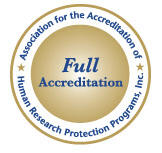This page provides a commentary on the AAHRPP Accreditation Standards for each Domain, followed by a link to the specific Standards.
Domain I: Organization
This Domain describes the structural characteristics of the entity that assumes responsibility for the HRPP and applies for accreditation. The organizational structure is the means by which the Organization meets the range of responsibilities of the HRPP.
The Organization applies its HRPP to all research regardless of funding source, type of research, or place of conduct of the research. The Organization exercises these responsibilities through relationships with Researchers and Research Staff, Institutional Review Boards (IRBs) or Ethics Committees (ECs), Sponsors, participants, and the community.
An Organization has the responsibility not only to protect the rights and welfare of human research participants but also to involve research participants in the research enterprise. The involvement of research participants at every stage of the research enterprise helps everyone to achieve the ethical principle of respect for persons. In addition to enhancing the appropriate safeguards and protecting the rights and welfare of research participants, involving research participants in the research process can improve recruitment and retention of participants and also improve the overall quality of research.
The conduct of research is highly dependent upon the partnership between Organizations and Sponsors. A Sponsor is the company, institution, individual donor, or government agency responsible for the initiation, management, or financing of a research study. Sponsors may enter into agreements with intermediaries that act as agents, such as contract research organizations or coordinating centers. In sponsored research, both the Sponsor and the Organization have obligations to protect human research participants. In this Domain, the focus is on the obligations of the Organization. In seeking accreditation, the Organization must address human research protection requirements with all Sponsors and applies its HRPP to all sponsored research.
View the Standards
Domain II: Institutional Review Board or Ethics Committee
Within a HRPP, responsibilities must be delegated for providing ethical review and oversight of research. These responsibilities are distributed differently in different organizations; in many organizations, the IRB or EC along with the support personnel and systems provide these functions. In more complex organizations, there might be multiple IRBs and a general oversight office. This Domain of Standards sets forth requirements for the ethical oversight of research.
An IRB or EC is a body established generally under laws, regulations, codes, and guidance to protect the rights and welfare of human research participants. The HRPP must have mechanisms in place to ensure the independence of its ethics review and oversight functions from other units within the Organization, particularly with respect to decision-making regarding the ethics of research involving human participants. IRB or EC structure, composition, operations, and review Standards are set forth in laws, regulations, codes, and guidance.
View the Standards
Domain III: Researcher and Research Staff
The environment in which Researchers and Research Staff conduct research and the type of research they conduct influence their roles and responsibilities. Competent, informed, conscientious, compassionate, and responsible Researchers and Research Staff provide the best possible protection for human research participants. This Domain of Standards sets forth requirements for Researchers and Research Staff involved in research involving human participants. As part of its HRPP, an Organization can improve its protection of research participants if it has arrangements ascertaining and enhancing the competence of Researchers and Research Staff.
View the Standards

